Books
Books
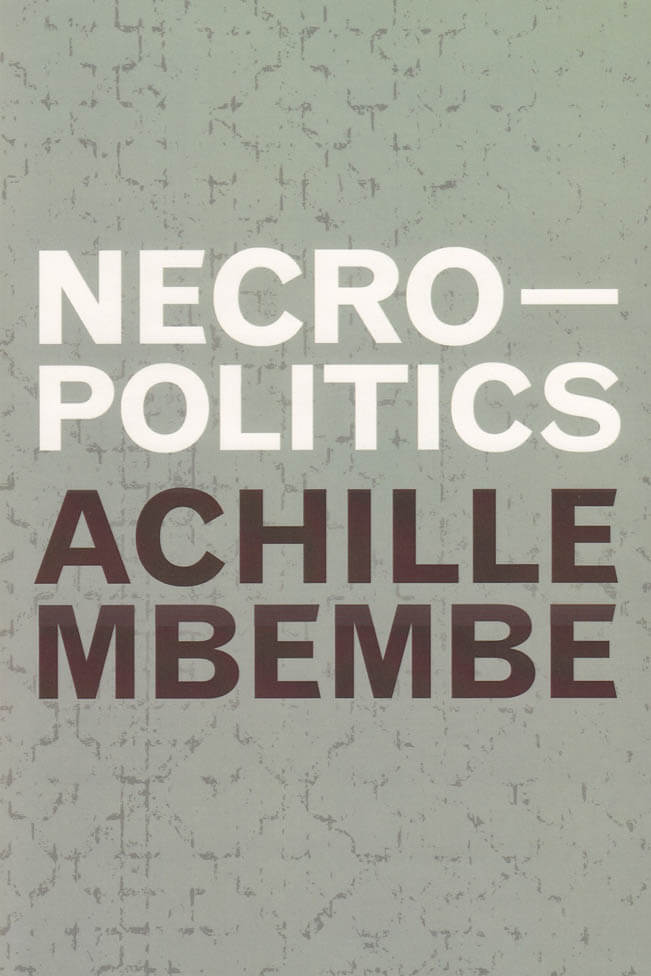
Necropolitics
In Necropolitics Achille Mbembe, a leader in the new wave of francophone critical theory, theorizes the genealogy of the contemporary world, a world plagued by ever-increasing inequality, militarization, enmity, and terror as well as by a resurgence of racist, fascist, and nationalist forces determined to exclude and kill. He outlines how democracy has begun to embrace its dark side—-what he calls its “nocturnal body”—-which is based on the desires, fears, affects, relations, and violence that drove colonialism. This shift has hollowed out democracy, thereby eroding the very values, rights, and freedoms liberal democracy routinely celebrates. As a result, war has become the sacrament of our times in a conception of sovereignty that operates by annihilating all those considered enemies of the state. Despite his dire diagnosis, Mbembe draws on post-Foucauldian debates on biopolitics, war, and race as well as Fanon's notion of care as a shared vulnerability to explore how new conceptions of the human that transcend humanism might come to pass. These new conceptions would allow us to encounter the Other not as a thing to exclude but as a person with whom to build a more just world.
(October 2019)
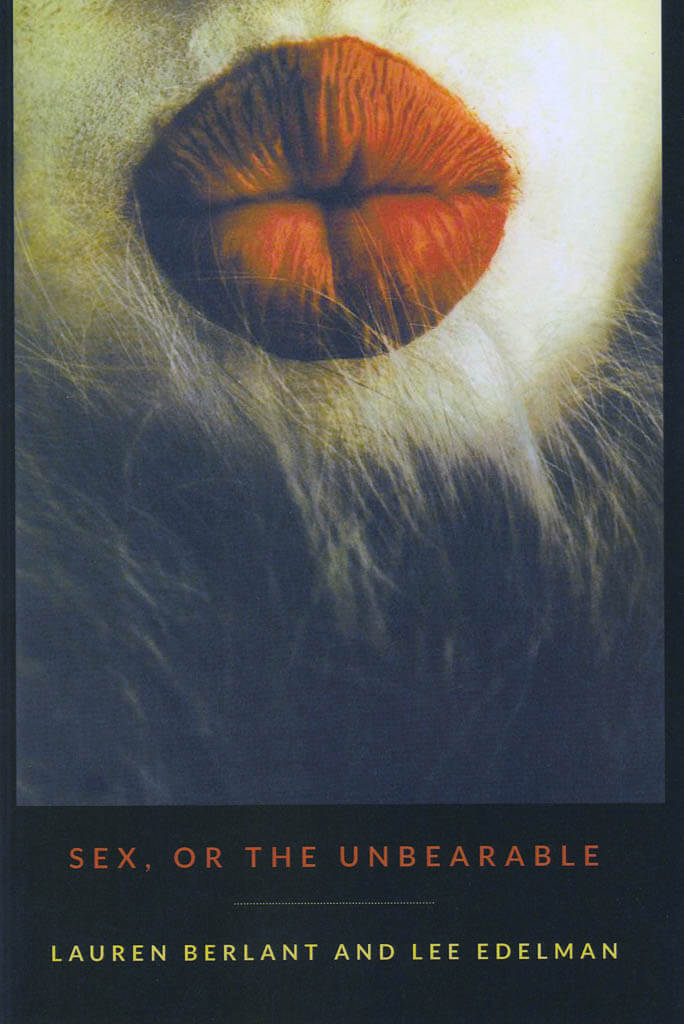
Sex, or the Unbearable
Sex, or the Unbearable is a dialogue between Lauren Berlant and Lee Edelman, two of our leading theorists of sexuality, politics, and culture. In juxtaposing sex and the unbearable they don't propose that sex is unbearable, only that it unleashes unbearable contradictions that we nonetheless struggle to bear. In Berlant and Edelman's exchange, those terms invoke disturbances produced in encounters with others, ourselves, and the world, disturbances that tap into threats induced by fears of loss or rupture as well as by our hopes for repair.
Through virtuoso interpretations of works of cinema, photography, critical theory, and literature, including Lydia Davis's story "Break It Down" (reprinted in full here), Berlant and Edelman explore what it means to live with negativity, with those divisions that may be irreparable. Together, they consider how such negativity affects politics, theory, and intimately felt encounters. But where their critical approaches differ, neither hesitates to voice disagreement. Their very discussion—punctuated with moments of frustration, misconstruction, anxiety, aggression, recognition, exhilaration, and inspiration—enacts both the difficulty and the potential of encounter, the subject of this unusual exchange between two eminent critics and close friends.
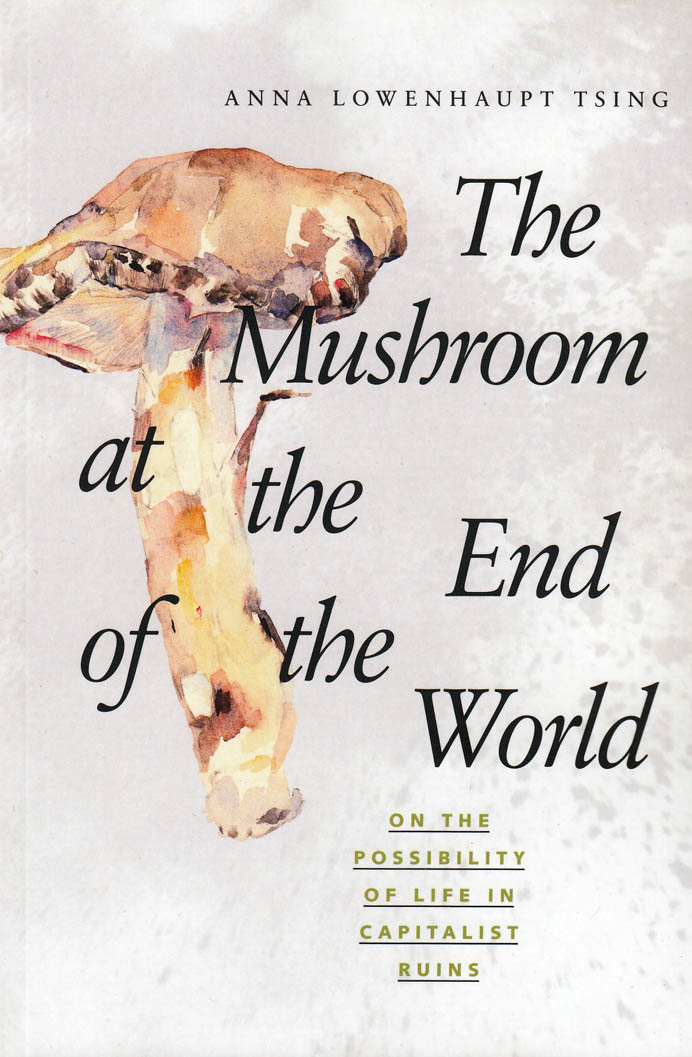
The Mushroom at the End of the World
What a rare mushroom can teach us about sustaining life on a fragile planet. Matsutake is the most valuable mushroom in the world,vand a weed that grows in human-disturbed forests across the northern hemisphere. Through its ability to nurture trees, matsutake helps forests to grow in daunting places. It is also an edible delicacy in Japan, where it sometimes commands astronomical prices. In all its contradictions, matsutake offers insights into areas far beyond just mushrooms and addresses a crucial question: what manages to live in the ruins we have made?
A tale of diversity within our damaged landscapes, The Mushroom at the End of the World follows one of the strangest commodity chains of our times to explore the unexpected corners of capitalism. Here, we witness the varied and peculiar worlds of matsutake commerce: the worlds of Japanese gourmets, capitalist traders, Hmong jungle fighters, industrial forests, Yi Chinese goat herders, Finnish nature guides, and more. These companions also lead us into fungal ecologies and forest histories to better understand the promise of cohabitation in a time of massive human destruction.
By investigating one of the world's most sought-after fungi, The Mushroom at the End of the World presents an original examination into the relation between capitalist destruction and collaborative survival within multispecies landscapes, the prerequisite for continuing life on earth.
"Scientists and artists know that the way to handle an immense topic is often through close attention to a small aspect of it, revealing the whole through the part. In the shape of a finch's beak we can see all of evolution. So through close, indeed loving, attention to a certain fascinating mushroom, the matsutake, Anna Lowenhaupt Tsing discusses how the whole immense crisis of ecology came about and why it continues. Critical of simplistic reductionism, she offers clear analysis, and in place of panicked reaction considers possibilities of rational, humane, resourceful behavior. In a situation where urgency and enormity can overwhelm the mind, she gives us a real way to think about it. I'm very grateful to have this book as a guide through the coming years." - Ursula K. Le Guin

Light in the Dark/Luz En Lo Oscuro: Rewriting Identity, Spirituality, Reality
Light in the Dark is the culmination of Gloria E. Anzaldua's mature thought and the most comprehensive presentation of her philosophy. Focusing on aesthetics, ontology, epistemology, and ethics, it contains several developments in her many important theoretical contributions.
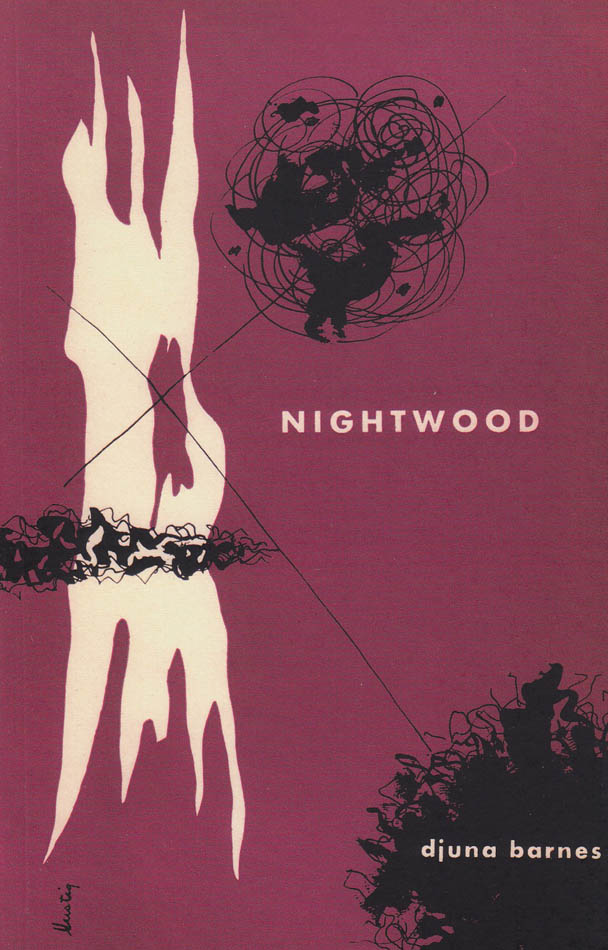
Nightwood
Nightwood, Djuna Barnes' strange and sinuous tour de force, "belongs to that small class of books that somehow reflect a time or an epoch" (Times Literary Supplement). That time is the period between the two World Wars, and Barnes' novel unfolds in the decadent shadows of Europe's great cities, Paris, Berlin, and Vienna—a world in which the boundaries of class, religion, and sexuality are bold but surprisingly porous.
The outsized characters who inhabit this world are some of the most memorable in all of fiction—there is Guido Volkbein, the Wandering Jew and son of a self-proclaimed baron; Robin Vote, the American expatriate who marries him and then engages in a series of affairs, first with Nora Flood and then with Jenny Petherbridge, driving all of her lovers to distraction with her passion for wandering alone in the night; and there is Dr. Matthew-Mighty-Grain-of-Salt-Dante-O'Connor, a transvestite and ostensible gynecologist, whose digressive speeches brim with fury, keen insights, and surprising allusions. Barnes' depiction of these characters and their relationships (Nora says, "A man is another persona woman is yourself, caught as you turn in panic; on her mouth you kiss your own") has made the novel a landmark of feminist and lesbian literature.
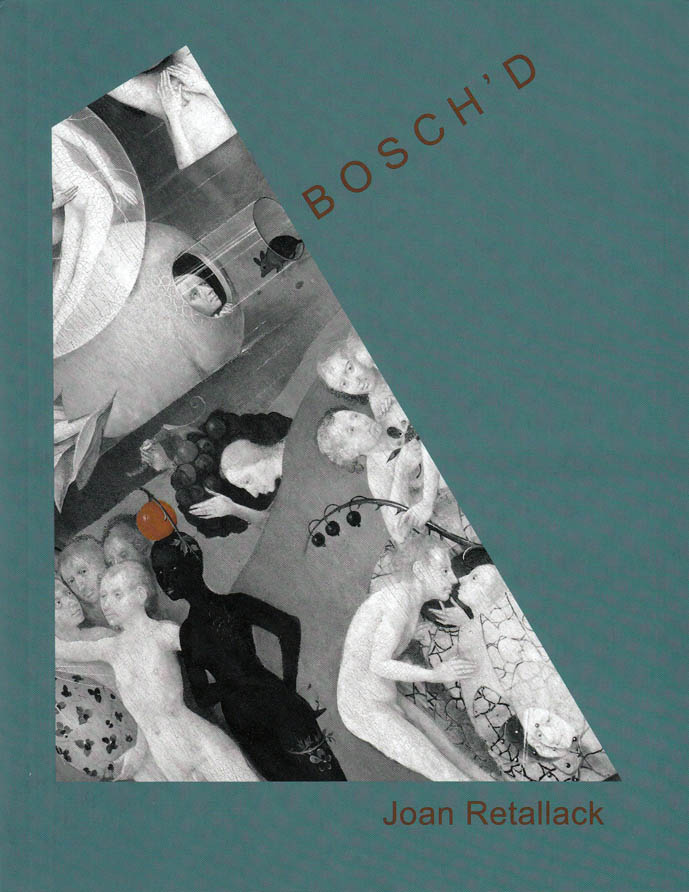
Bosch'd
Bosch'd spans space-time in a whimsical mix of poetry, quotation, fact, and insertion that all seems to point toward the dissolution of binary, the questioning of what's considered common knowledge, and how a poet works to enact change.
The first of many Bosch'd aphorisms states the opening condition this way: "Humor without gravitas passes through the mind with little effect; gravitas without humor is death." With that, Retallack takes on the paradoxical, hence generative, dystopian logics she calls "our projectile legacies"—misogyny, racism, undaunted colonialism, and more. It's where her playful and grave poetics of the poethical wager revs up. "As the sun at noon illustrates all shadows," Hieronymus Bosch illuminated a beautiful and grotesque biosphere (see Fig. x) that, along with tender sensuality and ubiquitous love, was riddled with human follies and trespasses we've come to identify as the Anthropocene. "Bosch'd" (verb. trans.) does not yet appear in our lexicons. For some of its implications, we present this erudite, searching, and great-humored book.
"This proliferation of angels, and angles, and spectra, and scenes, and singing is all but too beautifully blur to blurb. It defies its own collection. You have to ride, or hide, in an untied thought balloon to read it. It's so beautiful, with so much thought inside, and so loco, so such a little crazy in all its other languages, so off and errant but also so on the spot and dug in and garden'd, so unalone and shared and redshifted, so non-solo'd and so alter'd, that it becomes an altar, its music of alterity holding a delightful cultivation of flown that we can ground in, though it's also so nonlocal, so shar'd in the general speech, that even in the preparation of its table of contents, as if it were a piano on which bizarre things have been painted as the coming of froth, BOSCH'D blindsides despair. Who is Genre Tallique anyway? Bud Powell? An owl? Wow!"—Fred Moten
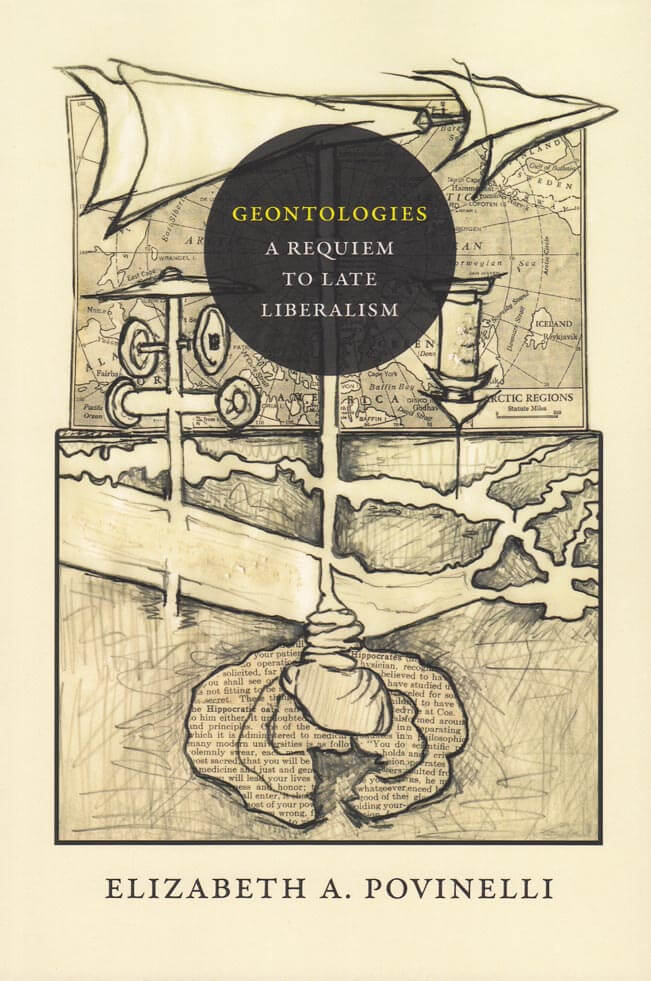
Geontologies: A Requiem to Late Liberalism
In Geontologies Elizabeth A. Povinelli continues her project of mapping the current conditions of late liberalism by offering a bold retheorization of power. Finding Foucauldian biopolitics unable to adequately reveal contemporary mechanisms of power and governance, Povinelli describes a mode of power she calls geontopower, which operates through the regulation of the distinction between Life and Nonlife and the figures of the Desert, the Animist, and the Virus. Geontologies examines this formation of power from the perspective of Indigenous Australian maneuvers against the settler state.
And it probes how our contemporary critical languages—anthropogenic climate change, plasticity, new materialism, antinormativity—often unwittingly transform their struggles against geontopower into a deeper entwinement within it. A woman who became a river, a snakelike entity who spawns the fog, plesiosaurus fossils and vast networks of rock weirs: in asking how these different forms of existence refuse incorporation into the vocabularies of Western theory Povinelli provides a revelatory new way to understand a form of power long self-evident in certain regimes of settler late liberalism but now becoming visible much further beyond.
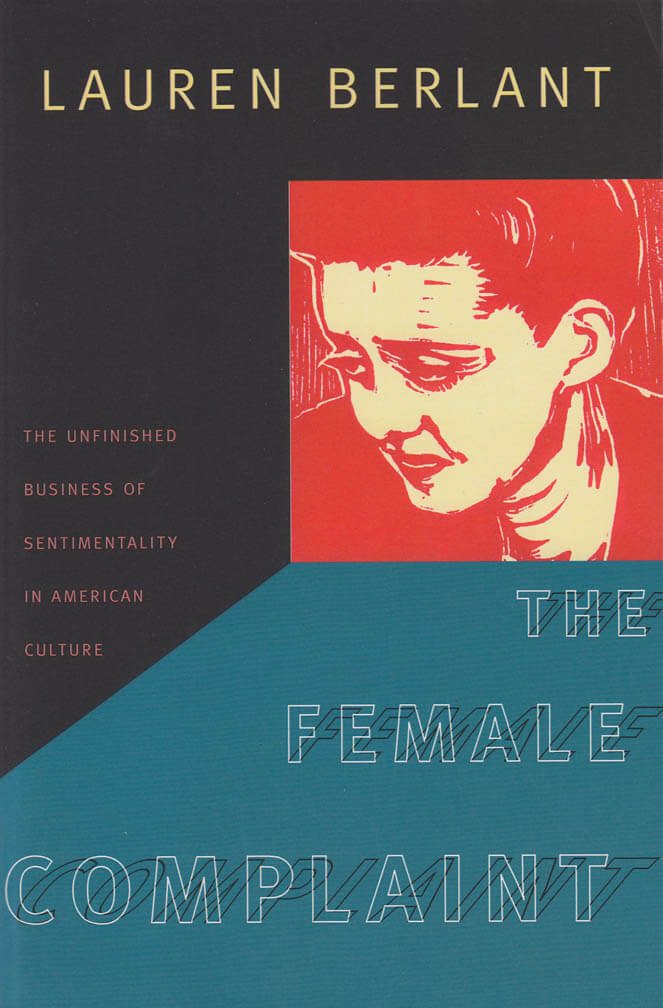
The Female Complaint
The Female Complaint is part of Lauren Berlant’s groundbreaking “national sentimentality” project charting the emergence of the U.S. political sphere as an affective space of attachment and identification. In this book, Berlant chronicles the origins and conventions of the first mass-cultural “intimate public” in the United States, a “women’s culture” distinguished by a view that women inevitably have something in common and are in need of a conversation that feels intimate and revelatory. As Berlant explains, “women’s” books, films, and television shows enact a fantasy that a woman’s life is not just her own, but an experience understood by other women, no matter how dissimilar they are. The commodified genres of intimacy, such as “chick lit,” circulate among strangers, enabling insider self-help talk to flourish in an intimate public. Sentimentality and complaint are central to this commercial convention of critique; their relation to the political realm is ambivalent, as politics seems both to threaten sentimental values and to provide certain opportunities for their extension.
Pairing literary criticism and historical analysis, Berlant explores the territory of this intimate public sphere through close readings of U.S. women’s literary works and their stage and film adaptations. Her interpretation of Uncle Tom’s Cabin and its literary descendants reaches from Harriet Beecher Stowe to Toni Morrison’s Beloved, touching on Shirley Temple, James Baldwin, and The Bridges of Madison County along the way. Berlant illuminates different permutations of the women’s intimate public through her readings of Edna Ferber’s Show Boat; Fannie Hurst’s Imitation of Life; Olive Higgins Prouty’s feminist melodrama Now, Voyager; Dorothy Parker’s poetry, prose, and Academy Award–winning screenplay for A Star Is Born; the Fay Weldon novel and Roseanne Barr film The Life and Loves of a She-Devil; and the queer, avant-garde film Showboat 1988–The Remake. The Female Complaint is a major contribution from a leading Americanist.

Word / World
Word/World is a book of three registers. The collections Alphabet Poems, Apples and Origins, and then the Word/World poems themselves, comprise the contents of this book. These three constitute a progression, through language, from the unruly, abstracted language of trauma, into a more integrated and embodied approach to a language that inhabits an awakened body in the present tense.
The fabric of Word/World spans heirloom seeds, police murders, witch burning, Ayahuasca tourism, shamanism, the asteroid Chiron, soul mates, alchemical principles, plant medicine, tantric sex, gangster rap and the end of American Apparel. It is an attempt to heal divisions and static states, and looks towards a world that exists outside of duality.
Building on the work of Morris’ first book, Word/World firmly establishes poetry as its own language, a language which borrows from but is not like other language, and in which ideas can be held, examined, questioned from different angles, and exploded.

Rabbit
The long-awaited third collection from one of the UK’s finest, most virtuosic of modern lyric poets. These poems take the reader on surprising journeys of healing, hard-won amid personal and social vicissitudes – including triumph over addiction, and alcoholism – and open spaces in which to share in emotional, quasi-spiritual transcendence despite. Who could ask for more? Rabbit was chosen for the PBS Wild Card Choice for Winter, 2018.
“When poetry is the centre of your life the strength of some poets will get fixed in the orbit of your day, their poems settled into the memory of mind and body. Sophie Robinson is one of my absolute favourites, her lines returning to me, visceral, unsettling, exacting, and stunning! If you read one book of poems this year, let it be this! She’s a gateway drug, keeping you wanting all books of poetry to be as genius to make part of your waking life.”
– CA Conrad, author of While Standing in Line for Death.
Sophie Robinson teaches Creative Writing at the University of East Anglia and is the author of A and The Institute of Our Love in Disrepair. Recent work has appeared in n+1, The White Review, Poetry Review, The Brooklyn Rail, Ploughshares, BOMB Magazine, and Granta.

This Paradise
A family prepares for Assessment; an au pair in the Caribbean wrestles with duty as a hurricane makes landfall; a game designer aches with bodily longing. Amidst it all, twins, heroines, mothers and rebels play out their lives under the strange grips of technology, governments, corporations and the capricious planet on which we all, in our different ways, just about manage to live.
This Paradise is a rare and beautiful collection of stories about people fleeing towards places or times or situations they hope might be better – trying to outrun their nature, to deny the undeniable. Written with an arresting eye for detail, a rich sense of compassion and a darkly comic understanding of the human psyche, the stories in this volume propose a series of haphazard questions, not least of which is: where do we run to when there’s nowhere left to run?

Wretched Strangers
In response to surges of violent British nationalism and political paranoia around borders, and to related social and ethical crises, JT Welsch and Ágnes Lehóczky have assembled an anthology to mark the vital contribution of non-UK-born writers to this country’s poetry culture. Wretched Strangers brings together innovative writing from around the globe, celebrating the irreducible diversity such work brings to ‘British’ poetry. While documenting the challenges faced by writers from elsewhere, these pieces offer hopeful re-conceptions of ‘shared foreignness’ as Lila Matsumoto describes it, and the ‘peculiar state of exiled human,’ in Fawzi Karim’s words.
The book is published by Boiler House Press to commemorate the anniversary of the June 2016 EU Referendum and in solidarity through struggles ongoing and to come. Proceeds will be donated to charities fighting for the rights of refugees.
Alireza Abiz • Astrid Alben • Tim Atkins • Andre Bagoo • Veronica Barnsley • Khairani Barokka • Leire Barrera-Medrano • Katherine E. Bash • Áine Belton • Caroline Bergvall • Sujata Bhatt • Rachel Blau DuPlessis • Fióna Bolger • Ben Borek • Andrea Brady • Serena Braida • Wilson Bueno • James Byrne • Kimberly Campanello • J.R. Carpenter • Mary Jean Chan • che • Matthew Cheeseman • Iris Colomb • Giovanna Coppola • Anne Laure Coxam • Sara Crangle • Emily Critchley • Ailbhe Darcy • Nia Davies • Tim Dooley • Benjamin Dorey • Angelina D’Roza • Katherine Ebury • Dan Eltringham • Ruth Fainlight • Kit Fan • León Felipe • Alicia Fernández • Veronica Fibisan • Steven J Fowler • Livia Franchini • Ulli Freer • Anastasia Freygang • Kit Fryatt • Monika Genova • Geoff Gilbert • Peter Gizzi • Chris Gutkind • Cory Hanafin • Edmund Hardy • David Herd • Jeff Hilson • Áilbhe Hines • Alex Houen • Anthony Howell • Nasser Hussain • Zainab Ismail • Maria Jastrzębska • Lisa Jeschke • Evan Jones • Loma Sylvana Jones • Maria Kardel • Fawzi Karim • Kapka Kassabova • Özgecan Kesici • Mimi Khalvati • Robert Kiely • Michael Kindellan • Igor Klikovac • Ágnes Lehóczky • Éireann Lorsung • Patrick Loughnane • John McAuliffe • Aodán McCardle • Niall McDevitt • Luke McMullan • Christodoulos Makris • Ethel Maqeda • Lila Matsumoto • Luna Montenegro • Stephen Mooney • Ghazal Mosadeq • Erín Moure • Vivek Narayanan • Cristina Navazo-Eguía Newton • Alice Notley • Terry O’Connor • Wanda O’Connor • Gizem Okulu • Claire Orchard • Daniele Pantano • Astra Papachristodoulou • Fani Papageorgiou • Richard Parker • Sandeep Parmar • Albert Pellicer • Pascale Petit • Adam Piette • Jèssica Pujol Duran • Alonso Quesada • Ariadne Radi Cor • Nat Raha • Nisha Ramayya • Peter Robinson • William Rowe • Lisa Samuels • Jaya Savige • Ana Seferovic • Sophie Seita • Seni Seneviratne • Timea Sipos • Zoë Skoulding • Irene Solà • Samuel Solomon • Agnieszka Studzinska • James Sutherland-Smith • George Szirtes • Rebecca Tamás • Harriet Tarlo • Shirin Teifouri • Virna Teixeira • David Toms • Sara Torres • Kinga Toth • Claire Trévien • David Troupes • Arto Vaun • Juha Virtanen • J. T. Welsch • David Wheatley • Elżbieta Wójcik-Leese • Jennifer Wong • Isaac Xubín • Jane Yeh

Animalia Paradoxa
A virus inflames a woman with mortal desire; a colonial naturalist seeks an impossible specimen; invisible violence stalks a safari and a man out walking enters into a strange shadow dance with a prizefighter. Ranging from taut human drama to phantasmagoria, these stories make rich and strange connections – between ancient and new, human and animal, Africa and Europe, reality and dream. Taken together, in prose of great precision and beauty, the stories in Animalia Paradoxa map the complexities of the human specimen, in all its troubling glory. This is fiction of the highest quality, from one of South Africa’s foremost novelists.
Henrietta Rose-Innes is a South African novelist and short story writer. She is the author of four novels, including Nineveh and Green Lion, which was shortlisted for the 2016 Sunday Times Fiction Prize and won the 2015 Prix François Sommer. Homing, a short story collection, was published in South Africa in 2010. She was the 2008 winner of the Caine Prize for African Writing and runner–up in the BBC International Short Story Award in 2012.

What The Fire Sees
A collection of anti-capitalist poetry, philosophy, cultural analysis, legal studies, manifesto and critique spanning 1996 to the present by Alenka Zupančič, Alexander Kluge, Amy Ireland, Anne Boyer, Aurelia Guo, Bini Adamczak, Carolyn Lazard, Chi Chi Shi, Denis Ekpo, Feminist Judgments Project, Gili Tal, Houria Bouteldja, Huw Lemmey, Keziah Craven, Marina Vishmidt, Nat Raha, Sarah Lamble, Teflon and Vanessa Place.
Divided we fall, but where do we land? This collection explores some of the grounds on which thinking and writing can begin again.
– Sadie Plant

Letters to Jill
The reprint of Pati Hill's 1979 book, composed of images and texts by Hill through which she intended to contextualize and explain her working methodology to Jill Kornblee, her New York gallerist.
Published on occasion of Pati Hill's first posthumous solo exhibition at Kunstverein München in 2020.
Pati Hill (1921, Ashland, Kentucky – 2014, Sens, France) left behind an artistic output spanning roughly 60 years and encompassing various disciplines. Untrained as an artist, she began to use the photocopier as an artistic tool in the early 1970s and continued to do so until her death, leaving behind an extensive oeuvre that explores the relationship between image and text. In addition to this comprehensive body of xerographic work, she published four novels, a memoir, several short stories, artists books, and poetry. Drawing also became an essential part of her practice.
By using the copier—a machine that was stereotypically linked to secretarial work and thus to feminized labor—to trace everyday objects such as a comb, a carefully folded pair of men's trousers, or a child's toy, Hill developed an artistic practice that programmatically translated invisible domestic labor into a visual and public language. Through her use of this reproductive apparatus, she created a model of artistic production that critically opposes the convention of individual expression as well as the supposed neutrality of technologically produced images.

Deux Soeurs
From Audre Lorde and Adrienne Rich to Basma Alsharif and Pauline Oliveros, Deux Soeurs brings together a chorus of voices that explore representations of parenthood, friendship, and disobedience.
The book acts as a reader to artist Beatrice Gibson's films, I Hope I'm Loud When I'm Dead (2018) and Two Sisters Who Are Not Sisters (2019), and includes material that informed Gibson's working process, together with the artist's texts and notes used in both films. Turning to the figure of the poet as a guide in times of chaos, Deux Soeurs presents a framework for an ethics of artistic and social collaboration.

This Container 08
Stefan Govaart, Maia Means and 1 more
Bringing together thirty authors variously invested in dance, performance and/or choreography; This Container is a zine for texts produced through and alongside dance, performance and choreography. Some write more than dance; others dance more than write. Some practice choreography explicitly; others implicitly. However varied the authors gathered here may be, the expansive field of performance produces all kinds of texts that deserve public recognition, a readership, and an infrastructure for feedback and editing. This issue is another attempt at making this possible.
With contributions by: Paula Almiron, Jani Anders Purhonen, Simon Asencio, Mélanie Blaison, Oda Brekke, Juan Pablo Cámara, Laura Cemin, Matt Cornell, Stina Ehn, Emma Fishwick, Lucija Grbic, Sara Gebran, Andreas Haglund, Hugo Hedberg, Alice Heyward, Madlen Hirtentreu, Eleanor Ivory Weber, Nikima Jagudajev, Sonjis Laine, Yoojin Lee, Denise Lim, Theo Livesey, Naya Moll, Caterina Mora, Rhiannon Newton, Zander Porter, Lena Schwingshandl and Stav Yeini.
Since its inception, This Container has hoped to contribute to a feminist lineage of textual production. What constitutes this lineage? This is a vast question. The beginning of an answer might start by saying something about genre. If , as Lauren Berlant writes, genre is an “aesthetic structure of affective expectation”, a “formalization of aesthetic or emotional conventionalities”, then genre crafts expectation by pointing to what is recognizable in form.1 If feminism is about wanting the world to be otherwise, the multiplication of genres inducing the multiplication of (imagined) stories helps to recraft expectation toward a less oppressive, less boring, and more just world. Feminist work includes genre work. Poetry, diary, diagram, notes, recipe, critique, the sound file, the epistolary, the essay, the art project: they have all found their way in, sculpting a diverse set of readerly structures of affective expectation. They are to shift your worldly expectations.
More info at http://www.thiscontainer.com
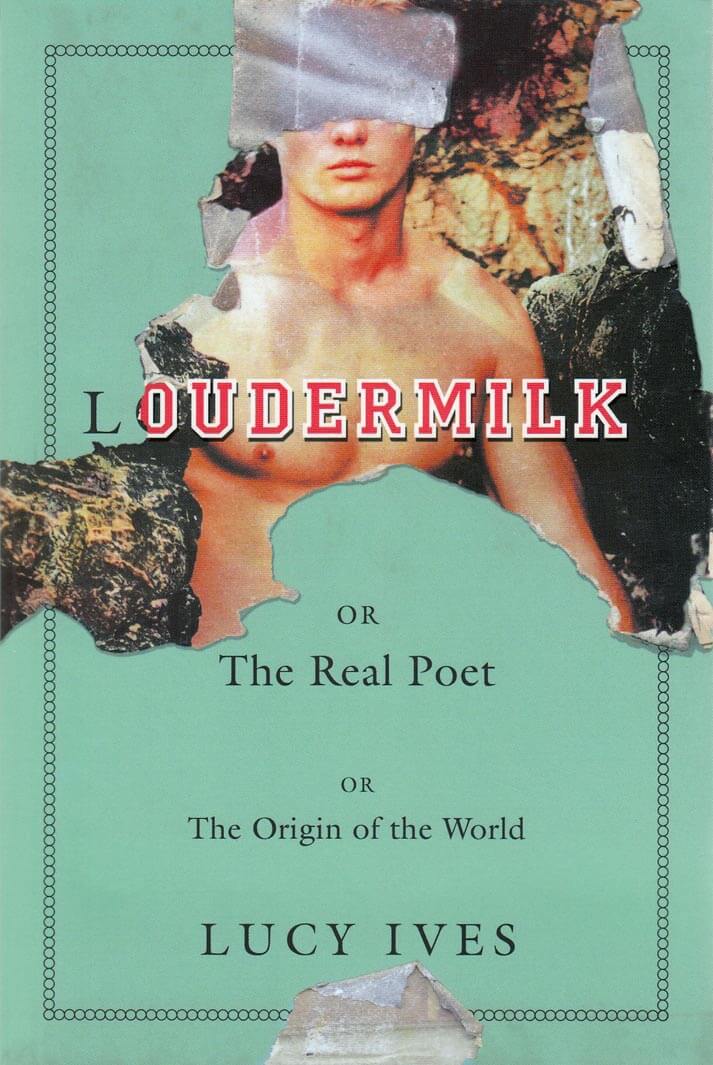
Loudermilk
A tale of two idiots—the handsome, charismatic Troy Augustus Loudermilk and his unassuming, socially anxious friend Harry Rego—who, in the early days of the new millennium, scam their way into a fellowship at the most prestigious creative writing program in the country.
"It's the end of summer, 2003. George W. Bush has recently declared the mission in Iraq accomplished and the unemployment rate is at its highest level in years. Meanwhile, somewhere in the Midwest, Troy Augustus Loudermilk (fair-haired, statuesque, charismatic) and his companion Harry Rego (definitely none of those things) step out of a silver Land Cruiser and onto the campus of The Seminars, America's most prestigious creative writing program, to which Loudermilk has recently been accepted for his excellence in poetry. However, Loudermilk has never written a poem in his life. For all Troy Loudermilk is—and, in the eyes of his fellow students and instructors, he is many things: a cipher to be solved, a hero to be championed, a rival to be disgraced—a poet he most certainly is not." — publishers note
Lucy Ives is the author of the novel Impossible Views of the World. Her writing has appeared in Art in America, Artforum, the Baffler, frieze, Granta, Lapham's Quarterly, Vogue, and at newyorker.com. For five years she was an editor with the online magazine Triple Canopy. A graduate of Harvard University and the Iowa Writers' Workshop, she holds a PhD in comparative literature from New York University. She currently teaches in the Image Text interdisciplinary MFA program at Ithaca College, as well as at NYU's XE: Experimental Humanities & Social Engagement Master's program. She is the recipient of a 2018 Creative Capital - Andy Warhol Foundation Arts Writers Grant.

Spinal Catastrophism: A Secret History
Drawing on cryptic intimations in the work of J. G. Ballard, Georges Bataille, William Burroughs, André Leroi-Gourhan, Elaine Morgan, and Friedrich Nietzsche, in the late twentieth century Daniel Barker formulated the axioms of spinal catastrophism: If human morphology, upright posture, and the possibility of language are the ramified accidents of natural history, then psychic ailments are ultimately afflictions of the spine, which itself is a scale model of biogenetic trauma, a portable map of the catastrophic events that shaped that atrocity exhibition of evolutionary traumata, the sick orthograde talking mammal.
Tracing its provenance through the biological notions of phylogeny and "organic memory" that fueled early psychoanalysis, back into idealism, nature philosophy, and romanticism, and across multiform encounters between philosophy, psychology, biology, and geology, Thomas Moynihan reveals the historical continuity of spinal catastrophism. From psychoanalysis and myth to geology and neuroanatomy, from bioanalysis to chronopathy, from spinal colonies of proto-minds to the retroparasitism of the CNS, from "railway spine" to Elizabeth Taylor's lost gill-slits, this extravagantly comprehensive philosophical adventure uses the spinal cord as a guiding thread to rediscover forgotten pathways in modern thought.
Moynihan demonstrates that, far from being an fanciful notion rendered obsolete by advances in biology, spinal catastrophism dramatizes fundamental philosophical problematics of time, identity, continuity, and the transcendental that remain central to any attempt to reconcile human experience with natural history.
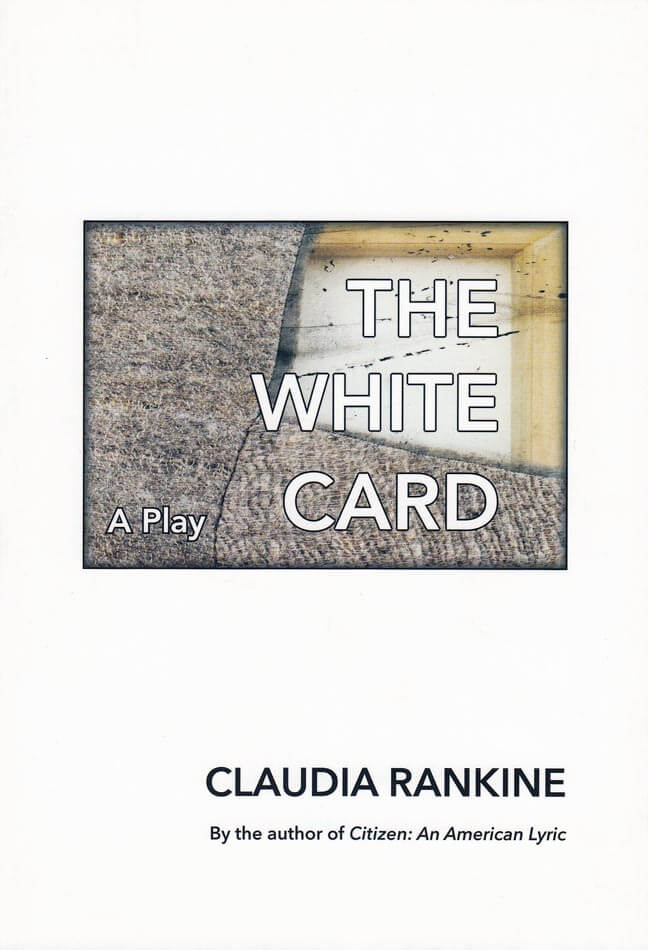
The White Card: A Play
The White Card stages a conversation that is both informed and derailed by the black/white American drama. The scenes in this one-act play, for all the characters' disagreements, stalemates, and seeming impasses, explore what happens if one is willing to stay in the room when it is painful to bear the pressure to listen and the obligation to respond.
—from the introduction by Claudia Rankine
Claudia Rankine's first published play, The White Card, poses the essential question: Can American society progress if whiteness remains invisible?
Composed of two scenes, the play opens with a dinner party thrown by Virginia and Charles, an influential Manhattan couple, for the up-and-coming artist Charlotte. Their conversation about art and representations of race spirals toward the devastation of Virginia and Charles's intentions. One year later, the second scene brings Charlotte and Charles into the artist's studio, and their confrontation raises both the stakes and the questions of what—and who—is actually on display.

Notes on Choreography
On the occasion of Merce Cunningham's centennial comes this edition of his classic and long-out-of-print artist's book Changes: Notes on Choreography, first published in 1968 by Dick Higgins' Something Else Press. The book presents a revealing exposition of Cunningham's compositional process by way of his working notebooks, containing in-progress notations of individual dances with extensive speculations about the choreographic and artistic problems he was facing.
Illustrated with over 170 photographs and printed in color and black and white, the book was described by its original publisher as "the most comprehensive book on choreography to emerge from the new dance ... [which] will come to stand with Eisenstein's and Stanislavsky's classics on the artistic process." By the time these notebooks were published, Cunningham had already led the Merce Cunningham Dance Company for 15 years, and had collaborated with Cage and others on milestones such as Variations V (1966) and RainForest (1968), the latter with Andy Warhol, David Tudor and Jasper Johns.
Along with his essay collection Dancing in Space and Time (1978), Changes is one of the most significant publications on Cunningham's enduring contributions to dance, which developed through collaboration with John Cage to incorporate formal innovation with regard to chance, silence and stillness.
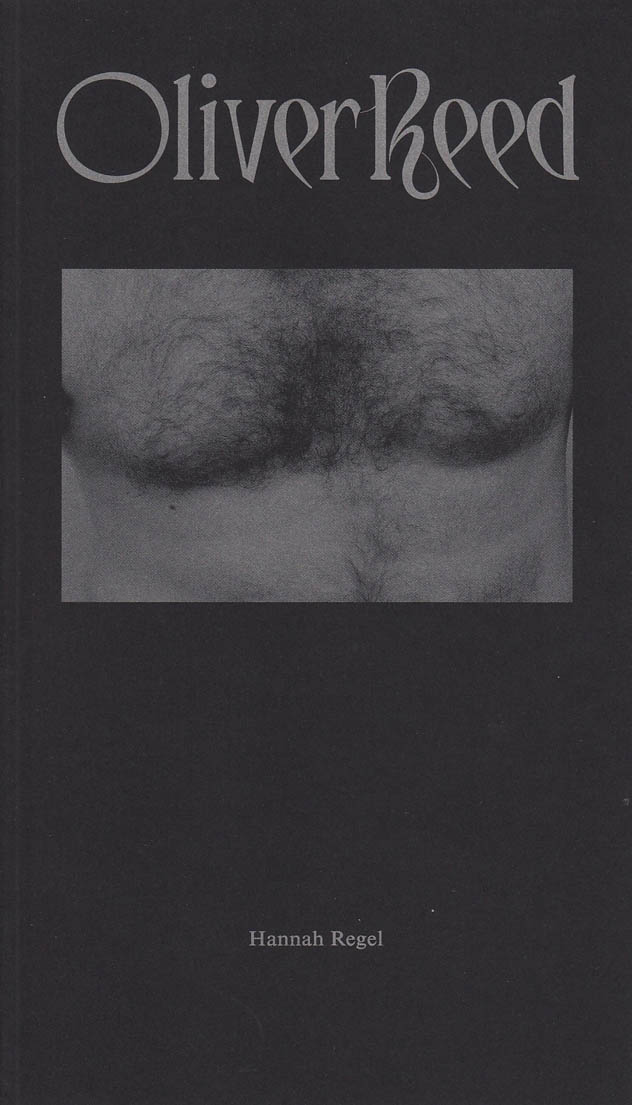
Oliver Reed
In Hannah Regel’s brilliant collection, Oliver Reed, the figure of the horse becomes an object for language’s brutality and the all too familiar subjugation of women’s voices, bodies, and labour. An impressive hyperbolic pastiche of pleasurable misbehavior guides a girl named Sorry through her own undoing while naming new tools for calculated resistance. ‘Kill the language. Kill it. Get the shovel. We’re making a belt.’ I would gladly do whatever she tells me to do and wouldn’t think of doing otherwise. Regel creates a new order for the ecstatic wreckage of obedience.
– Cassandra Troyan, author of Blacken Me Blacken Me, Growled
Regel doesn’t really sound like anyone. Oliver Reed introduces a poetic sensibility that seems as at odds with convention as it is equal to the moment: fully formed, virtuosic, kind of lethal. These are pitiless, discomforting poems that explore our own creatureliness with a deadly curiosity. Each is a transformation: the actor becomes a strange muse and guiding presence, to ‘smoulder a mobile furnace’; the horse, another of the book’s recurring figures, becomes more than an emblem of eros, labour and suffering; the young girl’s bratty insolence turns defiant and stricken. The voice wills these changes into being even as she ‘wills herself barren’. As much as they trouble and seduce, the poems are also watchful, vigilant – they seem to offer a means of protection. Oliver Reed is an astonishing, masterful first book.
– Sam Riviere, author of 81 Austerities

Ferrara Deux (Faits Divers)
faits divers are the various reports in a news bulletin, miscellaneous human interest stories, theorised by Roland Barthes as ‘total’ and ‘immanent’ information.
ferrara deux (faits divers) scrolls around the discovered corpse of a talented street musician named Landau, mangled and sealed into vacuum bags in the walk-in of a modern Italian-American restaurant. Street performance is content for an attention economy, playing on authenticities and profiting from recognition.
In this debut novel, artist Ivan Cheng reconfigures recent performance texts into an approximation of a murder mystery.

The Second Shelf: Rare Books & Words by Women
Issue Two includes: An Angela Carter Portfolio: Wolves in Fiction by Daisy Johnson, Pornography in Angela Carter by Arifa Akbar, and Angela Carter-inspired illustrations by Natalie Kay-Thatcher. Sharlene Teo on Qiu Miaojin. An interview with Dialogue Books publisher Sharmaine Lovegrove and her Ideal Bookshelf from Jane Mount. Fiona Lensvelt of Litwitchure on Pamela Colman Smith. Lucy Scholes interviews Posy Simmonds. A comic-strip profile of Veronica Santiago and Word-Up Bookshop by Ellen Lindner. Fiction by Sylvia Townsend Warner. Khaliah Williams of three generations of her family reading Jane Austen. And more! Cover photography is "A Study of the 'Katia Reading'" from the series "After Balthus - a Photographic Portrayal of the Paintings of Balthus" by Hisaji Hara.
23 × 17 cm, Softcover, 2019